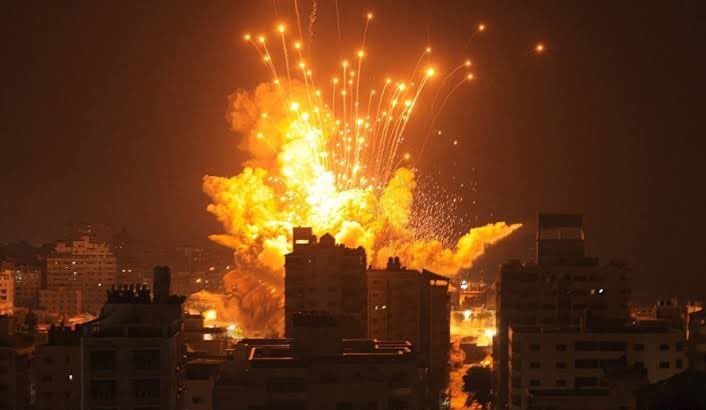The UN is sounding the alarm about an increasing risk of hunger and disease as Palestinian families take refuge in makeshift tents.
Israel continued to intensify its brutal attacks on central Gaza on Sunday, as Palestinians entered the new year with no end in sight to the Israeli genocide which has so far killed more than 21,800 people.
The regime’s Prime Minister Benjamin Netanyahu said the genocide would take “many more months” to end.
The spokesperson for the Israel occupation forces Daniel Hagari said that adjustments in troop deployments were underway to ready for an extended period of the genocide in Gaza.
“These adaptations are intended to ensure the planning and preparation for continuing the war in 2024,” he said.
“The IDF must plan ahead out of an understanding that there will be additional missions and the fighting will continue the rest of the year.”
The regime’s military decided to release certain reservists who were part of the Israeli offence in Gaza. The action, announced on Sunday by Hagari, is aimed at supposedly supporting the economy as the Occupation continues to extend its relentless war in Gaza.
Air strikes heavily targeted al-Maghazi and al-Bureij in central Gaza, killing 10 Palestinians in a single residence.
The attacks also prompted more people to evacuate to Rafah, located on the border with Egypt, as Israeli tanks continued to infiltrate the territories.
At least 48 Palestinians were killed in an overnight bombing in Gaza City on Sunday, with many still buried under the rubble, Gaza’s health ministry said.
Another strike killed 20 people seeking refuge at Al-Aqsa University in the west of Gaza City, witnesses said, according to reports.
Amid the intense Israeli raid in Gaza, the United Nations reported that 85% of Gaza’s 2.4 million population have been displaced.
The UN is sounding the alarm about an increasing risk of hunger and disease as Palestinian families take refuge in makeshift tents trying to withstand the winter cold.
The global community has witnessed with utter despair the transformation of the long-standing Israel occupation of Palestinians into the deadliest war on Gaza in history.
Just before the new year, activists initiated a worldwide effort urging individuals to transform their New Year’s countdowns into a countdown for a ceasefire in Gaza.
“New Year’s Eve is a moment of celebration worldwide, and an opportunity to create resolutions for a brighter future. With nearly 30,000 civilians killed, including over 10,000 children, our only New Year’s resolution is to call for a permanent ceasefire,” Countdown2Ceasefire, a London-based grassroots campaign, said in a statement on Thursday.
“Our aim is to morph the traditional New Year’s countdown into an influential and resounding countdown for a permanent ceasefire in Gaza.”
As the year 2023 came to an end, Palestinians in Gaza prayed for an end to the genocide, yet they were met with no solution and little hope that the upcoming year would bring about substantial change.
“Tonight the sky in world countries will be lit by firecrackers, and joyful laughs will fill the air. In Gaza our skies are now filled with Israeli missiles and tank shells that land on innocent, homeless civilians,” said Zainab Khalil, 57, a resident from northern Gaza now in Rafah, as quoted by Reuters.
Netanyahu declared that the war in Gaza was reaching its peak, emphasising Israel’s necessity to regain control of Gaza’s border with Egypt.
This area is currently crowded with Palestinians who have sought refuge from the widespread Israeli raid in other parts of the enclave.
To take over the border once again could essentially constitute a de facto reversal of Israel’s 2005 withdrawal from Gaza, prompting fresh uncertainties about the enclave’s future.
The United States expressed the view that, once the genocide end, Israel should permit a Palestinian government to assume control in Gaza.
“We just take a fundamentally different view here in terms of what post-conflict Gaza needs to look like,” White House national security spokesperson John Kirby said on ABC television.
Hussein al-Sheikh, a high-ranking official in the Palestinian Authority based in the Israeli-occupied West Bank, said through social media that Israel’s assumption of control over the border was a clear indication of an intention to “completely return the occupation.”
“We moved here from Khan Younis on the basis that Rafah was a safe place. There is no space in Rafah as it is overcrowded with displaced,” said Umm Mohammed, 45, a displaced Palestinian woman seeking shelter by the border.
“If they control the border, where will people go?” she asked, saying that would be “a disaster.”







